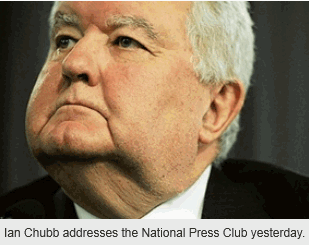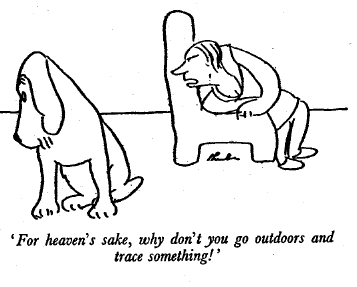|
|
|
|
|
|
|
News & Views item - June 2011 |
![]() Australian Chief Scientist, Ian Chubb, Addresses the National Press Club.
(June 22, 2011)
Australian Chief Scientist, Ian Chubb, Addresses the National Press Club.
(June 22, 2011)
Let me start by assuring you that after one month in the job I know that I
am far down a learning curve with a steep slope in front of me... [however,] I
know what to do – learn before you speak... therefore, I will focus on a
bit of "the vision thing": my role, not statistics and not great detail.
before you speak... therefore, I will focus on a
bit of "the vision thing": my role, not statistics and not great detail.
And Professor Ian Chubb, recently retired vice-chancellor of the Australian National University who the Minister for Innovation, Industry, Science and Research, Senator Kim Carr, appointed to the position of Chief Scientist on April 19 to assume the position on May 23, was as good as his word.
Professor Chubb spent a considerable time in emphasising that science is a good and important thing, although a considerable amount of what he defined as science others might have deemed to be technology. The distinction is not a trivial one where science seeks to understand in -- as much detail as possible -- the universe, technology makes use of that knowledge. Certainly it's not a one-way passage, technological advances are harnessed in the furthering of science as well as altering our lives and milieu if not always to their benefit.
Professor Chubb asked the rhetorical question: "Now, if science is so important - you may well ask - why does it struggle to cut through into the mainstream debate?"
His assessment: "Unfortunately, we seem to be living in a world where sport, celebrity and the 24 hour news or, more accurately, a 24 hour commentary cycle sprinkled with news, seem to dominate relentlessly," but makes no suggestions as to how to combat the problem of getting the population interested and our political establishment proactive. So for example Senator Carr will tell us how many billions the government has allocated to research and development but rarely notes where the nation stands relative to its cohort.
Professor Chubb sounded emphatic in telling the NPC: "Part of my responsibility is to ensure that the science is available; that scientific evidence is put in front of the politicians and policy writers in the public service. It may be from my office, or it may be because we know who to call to get it there - advice fully, frankly and directly available."
But if science is so important, why is his office not in the Department of the Prime Minister and Cabinet?
And if science is so important, why does the Prime Minister's Science, Engineering and Innovation Council (PMSEIC) rarely meet and is to all intents ignored?
And if science is so important, why did his immediate predecessor resign in frustration?
But these are matters of detail and go unanswered. TFW emailed the Chief Scientist last week asking if the date for the next PMSEIC meeting was scheduled. So far we've received no reply.
Nevertheless Professor Chubb told the NPC:
It is up to us to ensure that our contribution to knowledge is of a high
order, and of high quality, so that Australia's place in 'world affairs' is
secure. It will be secure if we
have something to say, and it will be because the world wants to hear what we
have to say - because of what we do... We have to be considered and purposeful.
And our work has to be of up there with the best. Our decisions and our policies
must be made consciously on the basis of good evidence... science [is] too
important to be left at the periphery of the decision making process.
But then does the spectre of top-down direction rear up surreptitiously and the advocate for the Group of Eight appear:
It is a simple fact that quality science can't be done at low cost, and mediocre science is no more acceptable than a 'begging bowl' would be. We need to make hard decisions about what we can and cannot do - since we can't do everything or support just anything. That means making one of the hardest decisions of all - selective investment. I want the Office of the Chief Scientist to play a substantial part in providing the evidence that not just underpins the hard decisions, but encourages them to be made.
Professor Chubb continued: "if as a nation we are to make bold, visionary and
difficult decisions we need a scientifically literate community. One that
understands that there will be uncertainty, but one that knows to give
appropriate weight to the consensus and to the critic."
but one that knows to give
appropriate weight to the consensus and to the critic."
Considering the overall state of scientific literacy in our parliaments and the overall competency of STEM education in our primary and secondary schools, just what strategy does the Chief Scientist propose to accomplish his goal?
I want to take up this issue. One of my first tasks will be to carry out a thorough check of Australia's science sector, its profile and its sustainability.
Wonderful, yet another survey.
And the conclusion, well a series of motherhood statements:
Science and innovation are the building blocks of a resilient and dynamic economy,
if we want science to contribute to our lives in 5, 10 or 20 years we need to start producing the scientists,
If we want to be a scientifically literate nation - we simply must inculcate the coming generations with an enthusiasm for the wonder, beauty and endless potential of science,
We need science teachers and we need to support them through their careers. We need students. It won't work without either. And to get them we will need to be careful, strategic and willing to invest.
And: I am here to help ensure the immense potential of science to create a better and more prosperous Australia is fully realised.
Well, fine words butter no parsnips.